A History of Israel’s Self-Hating Founders

When the victims of Zionism finally have their day in court, the world will see just how cruel and racist the early Zionists really were.
JERUSALEM — “Self-Hating Jew” — along with other terms like “traitor, Zhid, Kapo, Nazi, and Little Jew” — are among the epithets used by Zionists to insult Jewish people who oppose or reject Zionism and its racist ideology.
A recent episode of Rabbi Yaakov Shapiro’s podcast “Committing High Reason” recalls the history of Theodor Hertzl, the founder of Zionism and of the Zionist State, and sheds new light on the term “Self-Hating Jew.”
Committing High Reason
Rabbi Shapiro sources all of his claims methodically and when one hears what Hertzl, who was Jewish himself, wrote about Jewish people, the only conclusion is that he was the quintessential “Self-Hating Jew.”
There can be no doubt that he hated Jewish people and wanted nothing more than to dissociate himself from the “common” Jew. Furthermore, he was not alone: other Zionist leaders — Vladimir Jabotinsky, Chaim Weizmann, and others — were equally openly hateful of their Jewish brethren.
In 2018, Rabbi Shapiro published a book book titled “The Empty Wagon, Zionism’s Journey from Identity Crisis to Identity Theft.”
The book outlines the vast differences that exist between Judaism and its main nemesis, Zionism.
The book was written for Orthodox Jews and indeed every Orthodox Jewish home I have visited in the last two years had a copy of this massive work.
Even though it assumes a great deal of knowledge about Judaism, the book has an unprecedented amount of well-sourced information, so that even those of us who are not well versed in Judaism can learn a great deal from it.
The information presented in this particular episode of Rabbi Shapiro’s podcast can also be found in his book, and it leads to the undeniable fact that the founder of Zionism — and many of his contemporaries — hated everything about Jews and Judaism and hated the fact that they themselves were Jewish.
According to Rabbi Shapiro and many other Orthodox rabbis whom he quotes, it was their hatred of Jews and not their desire to save them from anti-Semitism that was the driving force behind the creation of Zionism and the establishment of a Zionist state.
The founder of Zionism not only believed that the anti-Semitic trolls about Jews were true, but also justified them.
He claimed only that these racist accusations applied to the “other” Jews, those who were not as secular and “enlightened” as he.
The story of Hertzl, as it is told in Zionist schools both in Israel and around the world, makes him seem like the savior of Jews, a man motivated by the desire to do good.
However, a more in-depth look into the man and his motivations reveals that he despised Jewish people and wanted to separate himself from “common” Jews by creating a space, an existence for people like himself who were Jews by birth but despised what it means to be Jewish.
Vladimir Jabotinsky, the father of right-wing Zionism and today’s Israeli Likud Party, was another classic case of the “Self-Hating Jew.”
He wrote that “[t]he Jews are very nasty people and their neighbors hate them and they are right.”
Another Zionist spiritual leader, Uri Zvi Greenberg, wrote: “Those loathsome Jews are vomited by any healthy collective and state not because they are Jews but because of their Jewish repulsiveness.”
Zionists worship physical strength while Orthodox Judaism looks down upon it. In a conversation I had once with Ultra-Orthodox Rabbi Dovid Feldman of New York, I asked about this. I told him that to people like me, who were raised Zionist, Orthodox Jews look weak and pale and very unattractive. Rabbi Feldman looked straight at me and replied: “You have no idea how hard we work to maintain this look. Being a Jew is a spiritual-religious existence, not a masculine physical one.”
Maushel (or Moishel)
In the October 15, 1897 edition of the Zionist paper Dei Welt, a publication that Hertzl founded, he published an essay, titled “Maushe,” about a Jew who is an anti-Zionist.
The focus of the essay was a fictional character, a Jew Hertzl called “Maushel,” which was a derogatory name for Jews used by anti-Semites at the time.
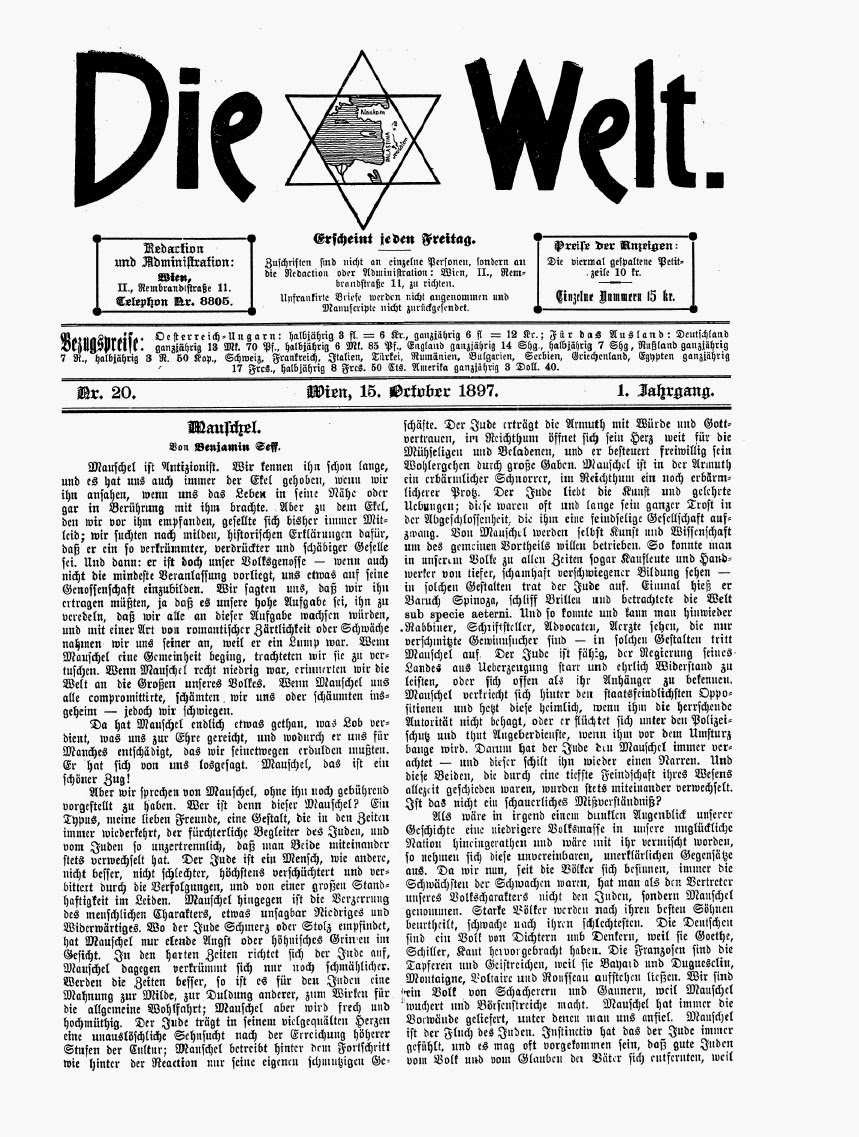
Maushel — or Moishel, depending on one’s accent — is the “common” religious Jew. The article was originally written in German, with an English version published in another Zionist publication called The Maccabean.
Here are a few examples of how Hertz depicts the Jews in his essay:
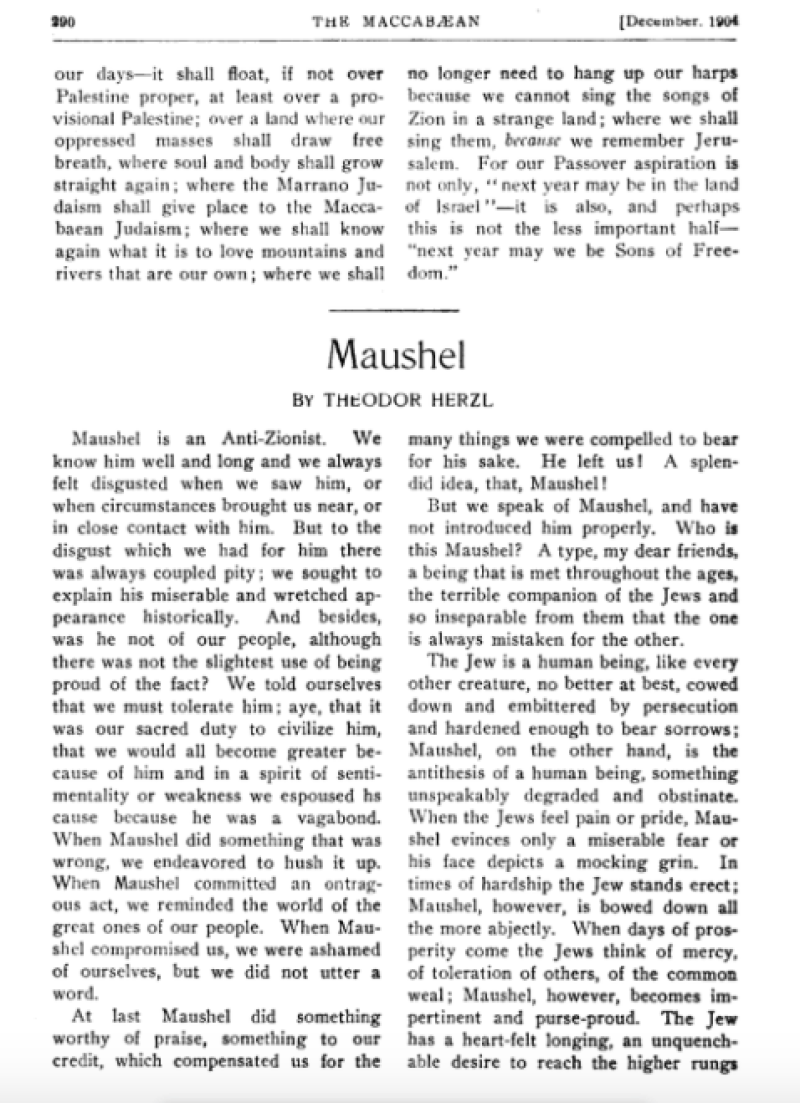
“Maushel is an anti-Zionist. We know him well and long and we always felt disgusted when we saw him.”
Hertzl is all the more disgusted and chagrin by being obliged to acknowledge that Maushel is indeed “of our people,” though there is “not the slightest use of being proud of the fact,” which he laments results from “the co-mingling at one dark period of our history of a lower class of people with our nation.”
Hertzl goes on to say that “[t]he disgust which we had for him was coupled with pity. We sought to explain his miserable and wretched appearance. We told ourselves that we must tolerate him that it was our sacred duty to civilize him.”
Wanting to disassociate himself from the Maushel Jew, Hertzl says, “He is the terrible companion of the Jews and so inseparable from them that one is always mistaken one for the other. “
Hertzl continues with his blatant hatred and writes that Maushel is “the antithesis of a human being, something unspeakably degraded and obstinate…Maushel proceeds with his own dirty business in poverty Maushel is a wretched schnorrer.”
Then sadly Justifying anti-Semitic attacks on Jews, Hertzl says, “Maushel always supplied reasons for the attacks upon us.”
In other words the Jews, the “real” Jews” like Hertzl are targeted by anti-Semites because of this distant, unrelated person who the anti-Semites confuse for a Jew.
Further, Hertzl writes:
In the eyes of the anti-Semite the Jew and Maushel were bound together; then Zionism appeared and the Jew and Maushel had to define their position, and now Maushel did the Jews a service: he divorced himself from the union because he is an anti-Zionist.”
In other words, Hertzl claims that only the real Jews are secular Zionist Jews.
He then goes on to conflate anti-Zionism with anti-Semitism: “When people say that Jews do not support Zionism the answer is no!
The Jew cannot be an anti-Zionist, only Maushel is.”
Rhetoric like this is very common in Israel today, that the real Jews are the secular Zionists and religious non-Zionist Jews are described in a variety of derogatory terms.
“That’s fine,” Hertzl continues, “let us be relieved of him. It is an opportunity to purify ourselves of these degrading elements.”
The confusion regarding Jewish identity and the claims that Zionism is part of Jewish identity is very common, and indeed very troubling.
This deep misunderstanding of both Judaism and Zionism clearly can be traced back to the founder of Zionism, Theodor Hertzl.
What makes a Jew a Jew?
The great Jewish sage, Rabbi Sa’adiya Ga’on- – whose full name was Sa’id Bin Yousef El-Fayyumi — was one of the most important Jewish rabbinic figures of all times.
He was born in Fayyum in upper Egypt in the late Ninth century; went on to study in Tabariya, Palestine, which was an important center of Jewish learning; and later lived, worked, and wrote in Baghdad.
In what is considered one of his most important books — “Emunot Ve-Deot,” or “Beliefs and Opinions,” which he wrote in Arabic using Hebrew letters — Ga’on wrote that the people of Israel — in other words, Jews — are a nation only by virtue of their religious laws (he used the term Sharia in Arabic for religious laws). In other words, a people bound by faith.
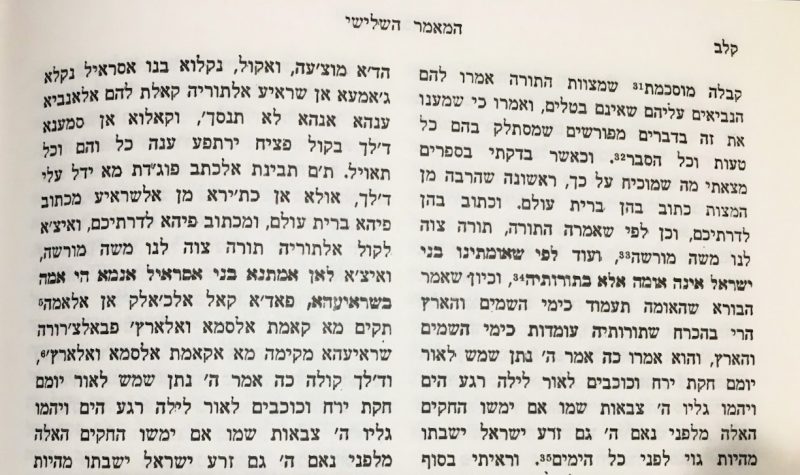
According to Hertzl, Jews are a nation because, as he put it, “our enemies made us one without our consent; distress binds us together.”
The former defines Jewish people as a religious group bound by laws and faith, the latter as an undefined group united by the hatred of non-Jews.
A eulogy to Hertzl
Vladimir Jabotinsky’s eulogy to Hertzl was a monumental offering of praise and even veneration.
First published as a booklet in Odessa in 1905, it was written in Russian and later translated into Hebrew.
In it, Jabotinsky discusses the legacy of Hertzl, whom, despite their differences, he admired deeply.
In one section, Jabotinsky praises the wonderful features of a Hebrew and compares them to what he calls the disgusting features of a Jew.
Instead of saying Jew, he used the horribly degrading, anti-Semitic term “Zhid.”
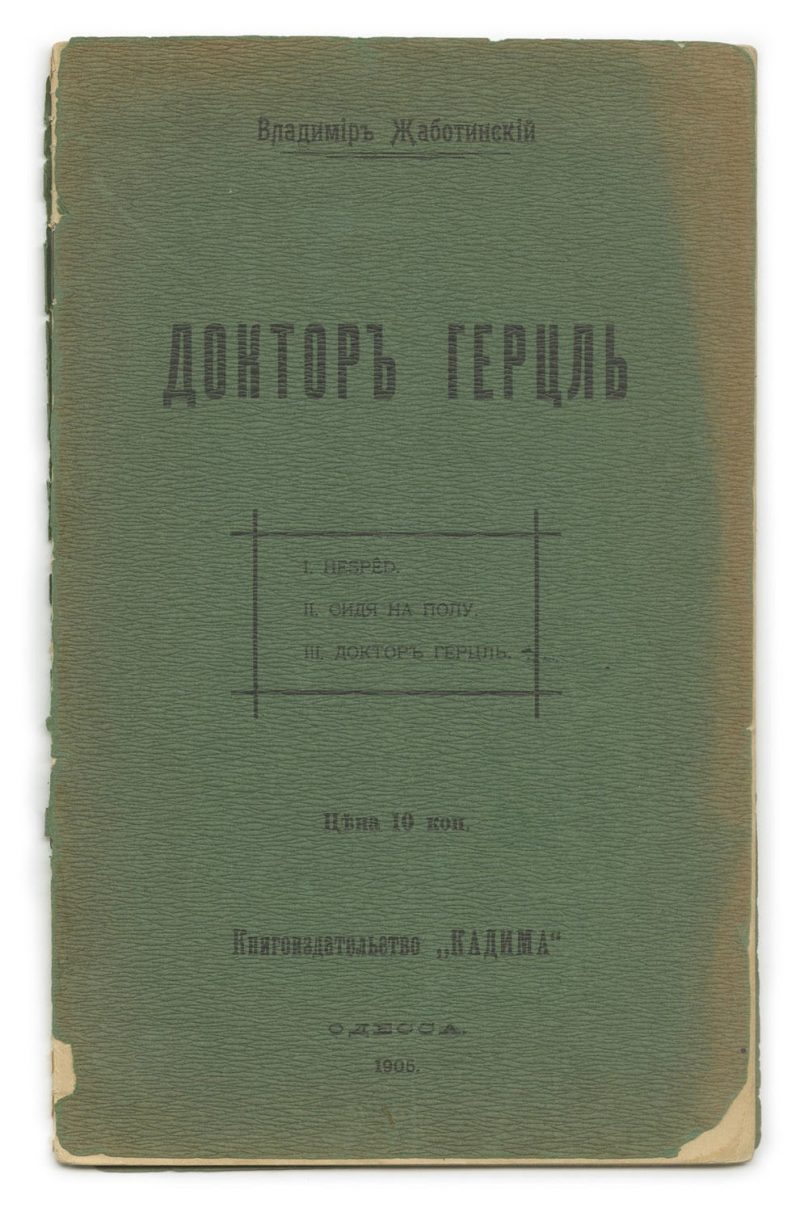
The eulogy begins with Jabotinsky admitting that no one has ever seen a true Hebrew (“None of us has seen the true Hebrew with our very eyes.”) and continuing on to say that the Jew we see around us today is not a Hebrew but a Zhid (“And so today, we take as our starting point the Zhid, and try to imagine his exact opposite,” in an effort to imagine a Hebrew.).
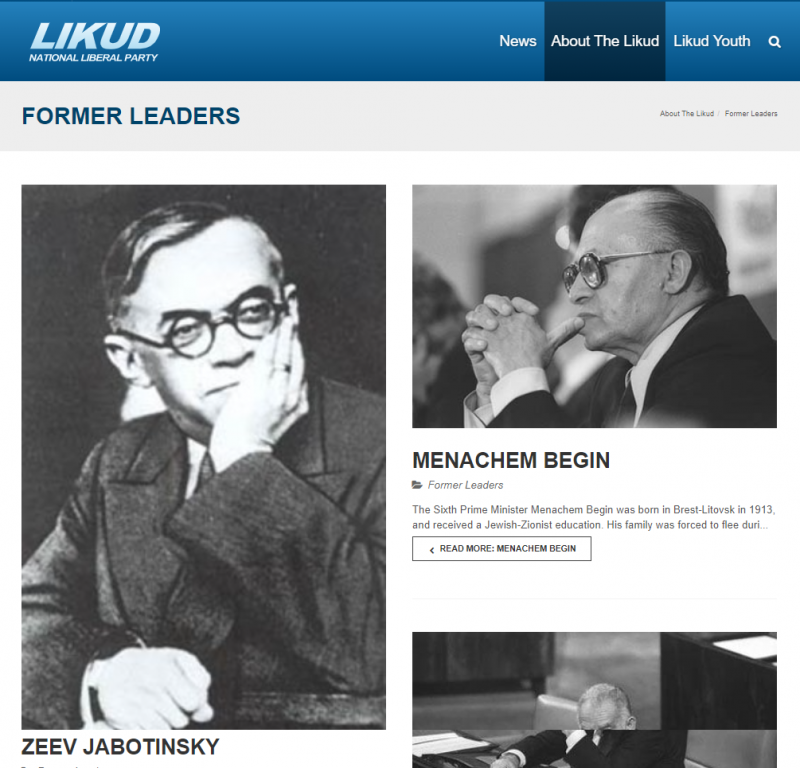
“Because the Zhid is ugly, sickly,” the father of Israel’s Likud Party writes, “we will give the ideal image of the Hebrew masculine beauty, stature, massive shoulders, vigorous movements,” Jabotinsky concludes:
The Zhid is frightened and downtrodden, the Hebrew proud and independent. The Zhid is disgusting to everyone, the Hebrew should be charming to all. The Zhid accepts submission, the Hebrew ought to know how to command. The Zhid likes to hide from the eyes of strangers, the Hebrew will possess brazensess and greatness.”
Hertzl, according to Jabotinsky, was the perfect specimen of the Hebrew that no one has ever seen.
Zionism — for whom?
If indeed Hertzl and the other leaders of Zionism were self-hating Jews and looked down upon the “common” Jew, what was their motivation for establishing Zionism and working so hard to found a Zionist State?
In Chapter One of his book, Rabbi Shapiro quotes one of the most respected rabbis of his day, Rabbi Chaim Soloveichik, who lived in Eastern Europe at the end of the nineteenth century.
According to the quote, Rabbi Soloveichik says that Zionists wanted to create a state in order to destroy Judaism.
In other words, Zionists were secular and viewed themselves as enlightened and better than the “common” Jew.
hey looked down at Torah-observant Jews. They wanted a place where people like them, who did not look or live like “common” Jews, would be able to live without having to deal with (or even see) observant Jews, and where they could be like other nations.
The State of Israel was not created for the “common” Jew, the one with a long beard and payot (the curls that dangle from the side of their heads), those who lived in the shtetl (ghettos) of Europe.
Neither was the Zionist state created for the Arab Jew, but for the secular European Jew, who wants more than anything to be European.
In a book that describes how Zionist leaders viewed the Jews of Europe, there is a photo that shows Jews in the market in Nalewni Ghetto in Warsaw.
There is a quote attributed to Chaim Weizmann, a major leader in the Zionist movement and later the first president of the State of Israel.
The caption reads, “Eretz Yisrael (the Land of Israel, or Palestine) was not meant for the peddlers of Nalewski, Warsaw.”
These are the Jews that Hertzl and the other Zionist leaders despised.
When the victims of Zionism finally have their day in court, the world will see just how cruel and racist the early Zionists really were.
The world will see that Israel, today’s Zionist state, is a perfect reflection of what the early Zionists were: racist, violent, and hateful.
In Israel today, Ultra-Orthodox Jews who oppose Zionism are despised and ridiculed; non-religious, anti-Zionist Jews are pushed away; and Palestinians are merely collateral — the price that needs to be paid so that the vision of Hertzl and the other “Self-Hating Jews” could become a reality.
***
Miko Peled is MintPress News contributing writer, published author and human rights activist born in Jerusalem. His latest books are”The General’s Son. Journey of an Israeli in Palestine,” and “Injustice, the Story of the Holy Land Foundation Five.”
Published by Mintpress News
Republished by The 21st Century
The views expressed in this article are solely those of the author and do not necessarily reflect the opinions of 21cir.
